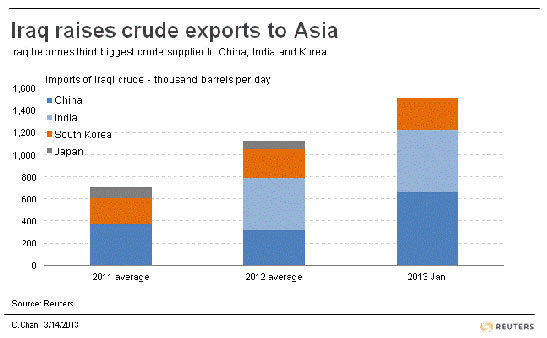Reuters/London
Iraq aims to ramp up oil production by nearly 45% by the end of next year - without any input from its autonomous Kurdistan region - which suggests a lasting compromise in their long-running oil feud may be a way off.
Baghdad’s ambitious 4.5mn bpd target specifically excludes output from the northern Kurdish region, senior Iraqi officials said, and relies on new oil pumped from southern oilfields and higher flows from ones already producing.
Thamir Ghadhban, energy adviser to Iraq’s prime minister, said Baghdad had lost confidence in Kurdistan after the region stopped exporting oil through the federal pipeline system. “The 4.5mn bpd is based on the development of the resources within the 15 governorates excluding Kurdistan because of this issue,” Ghadhban, a former oil minister of Iraq, said at an energy conference in London last week.
Kurdistan says it is owed more than 4tn Iraqi dinars, or $3.5bn, by Baghdad to cover the costs accumulated by oil companies operating there, while the central government rejects those contracts as illegal.
The northern region used to ship crude through a pipeline network controlled by Baghdad, but exports via that channel stopped last December due to the payments row.
“We are not going to start again and make the same mistakes,” said Ashti Hawrami, natural resources minister of the Kurdistan Regional Government (KRG).
He confirmed that Kurdish oil is excluded from the 4.5mn bpd target, part of Iraq’s blueprint for long-term energy development - launched last week in Baghdad.
Hawrami said the strategy document - first seen by him on Tuesday - was “for the rest of Iraq, not northern Iraq”.
“I’m afraid we have never been consulted and we do not have any input into this document,” he said. “It excludes the Kurdistan region’s potential completely.”
The dispute between Baghdad and Kurdistan is part of wider disagreements over who controls the world’s fifth-largest oil reserves. Iraq says it alone has the exclusive right to export oil and sign deals, but Kurdistan says the constitution allows it to agree contracts and ship oil independently of Baghdad.
Iraqi Deputy Prime Minister Rosh Nuri al-Shawish said recent talks in the Kurdistan regional capital Arbil between the prime ministers of Iraq and Kurdistan had resulted in the formation of a high-level committee to focus on the oil and gas law and revenue-sharing legislation.
Reaching the high output level of 4.5mn bpd by the end of 2014 will be a real stretch for Opec’s No 2 producer, given myriad logistical and infrastructure bottlenecks and the disruption caused by the dispute between Baghdad and Kurdistan.
After stagnating for decades due to wars and sanctions, Iraq’s oil output and exports began to rise in earnest in 2010 after Baghdad secured service contracts with companies such as BP, Royal Dutch Shell, Eni and ExxonMobil.
Swift gains have raised Iraqi production by 600,000 bpd over two years to 3.15mn bpd. Iraq is due to reach 3.4mn bpd by the end of this year and export 2.9mn bpd - but that includes 250,000 bpd from Kurdistan.
For its part, the northern region is producing just under 200,000 bpd and exporting about 65,000 bpd by truck through Turkey to world markets. It has secured exploration contracts with the likes of Exxon, Chevron and Total.
Reaching Iraq’s 2014 target will require the start-up of the giant Majnoon oilfield, operated by Shell, and West Qurna-2, run by Russia’s Lukoil, along with Garraf and Badra - further north.
Ghadhban expects Majnoon to ramp up in July. By then, around 220,000 bpd of capacity should be installed, said Hans Nijkamp, Shell’s vice president and country chairman for Iraq.
The three production scenarios outlined in Iraq’s “Integrated National Energy Strategy” included output from the KRG, said Ghadhban.
Under a high-production scenario, production would reach 13.5mn bpd by 2017 and be maintained until 2023. A low-production scenario targets 6mn bpd by 2025.
Baghdad is expected to enforce the medium-production scenario, where output reaches 9mn bpd by 2020. That will require renegotiating service contracts with foreign firms.
Lukoil - at West Qurna-2 - and Italy’s Eni - at Zubair - have already agreed to reduce production targets. Other companies, such as BP, Exxon and Shell are in similar talks.

